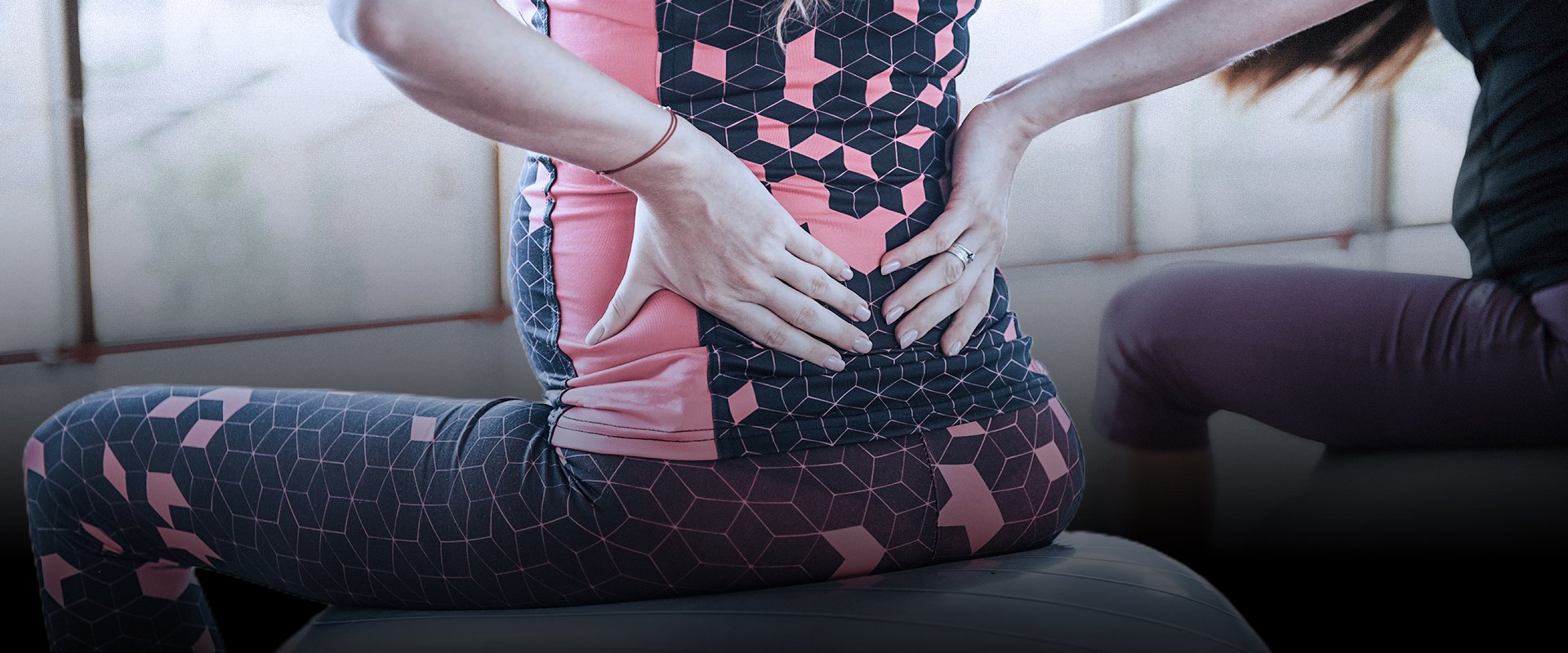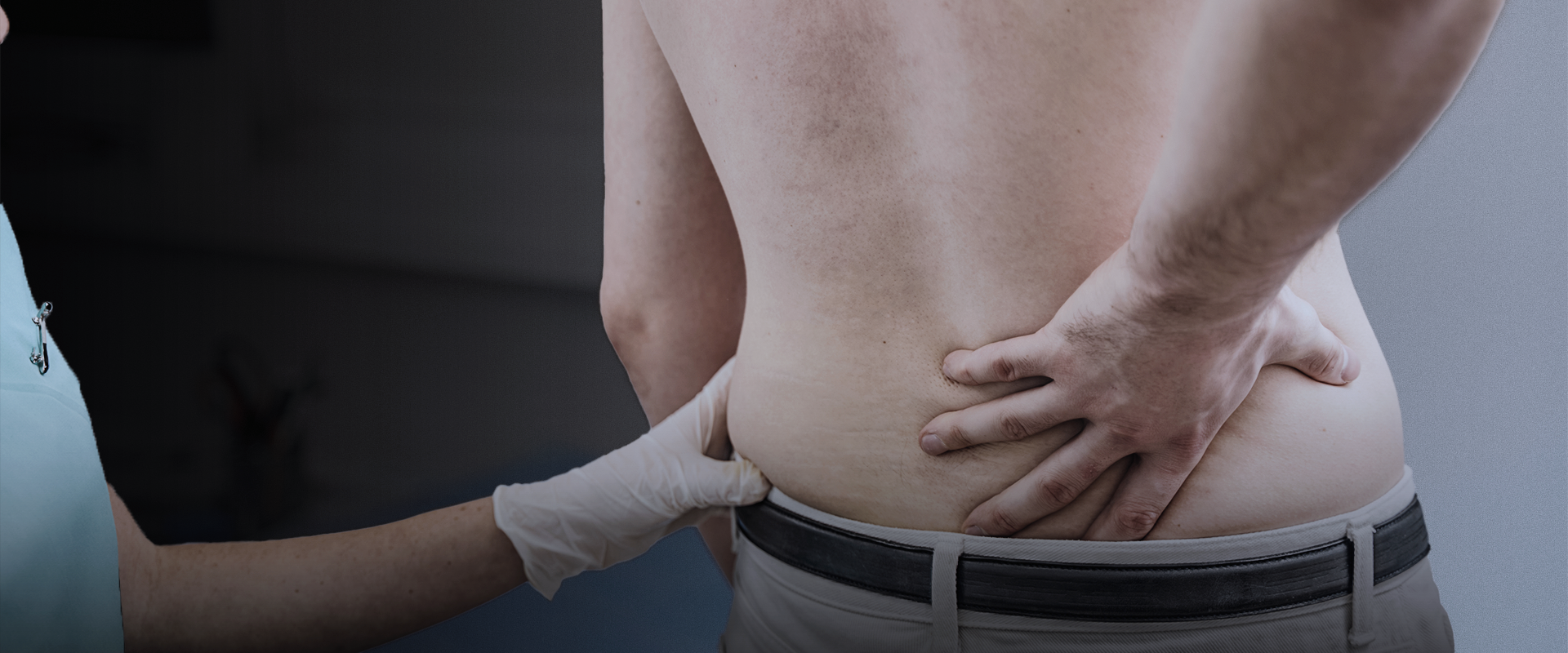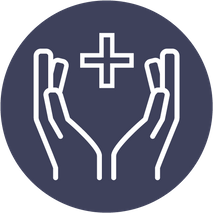
Physical Therapy for lumbar radiculopathy
AT EVOLVE
Physical Therapy for lumbar radiculopathy
HOW CAN PHYSICAL THERAPY HELP LUMBAR RADICULOPATHY?
Lumbar radiculopathy refers to the compression of spinal nerve roots in the lower back. Numbness, tingling, shooting pain and muscle weakness can all be symptoms of lumbar radiculopathy. Physical therapists are movement specialists trained to evaluate and treat neuromuscular and musculoskeletal conditions like lumbar radiculopathy. In most cases, physical therapy is a first-line treatment for symptoms of nerve compression in the back.
WHAT DOES PHYSICAL THERAPY TREATMENT FOR A PINCHED NERVE IN THE BACK LOOK LIKE?
Physical therapy treatments for lumbar radiculopathy aim to reduce nerve compression in order to alleviate symptoms like pain, burning, numbness or tingling; improve muscle strength; address underlying factors and facilitate return to full activity. My team of therapists and I will start by getting to know your concerns and goals and performing a thorough physical exam of the spine while identifying factors that may be contributing to the nerve compression. Your therapist will employ manual therapy interventions to target spine and tissue mobility while also prescribing movements and exercises for nerve mobility, muscle strength and motor control to be performed in the home and the clinic. Modalities to reduce inflammation around the nerve may also be prescribed.
HOW LONG WILL I NEED PHYSICAL THERAPY?
The duration of your physical therapy plan of care will vary depending on the severity of symptoms, what is causing the compression and the types of activities you aim to resume. While full resolution of symptoms can take some time, you may begin to see some results fairly quickly. You should experience some improvements in symptoms such as pain and stiffness within a couple of weeks though returning to pain-free activities may take longer. Achieving long-lasting results may take some time, but dedication to your program will not only help you achieve these results but will help to decrease the likelihood of symptoms recurring in the future.
A DEEPER LOOK AT LUMBAR RADICULOPATHY…
The lumbar spine is located in the lower back. It consists of the L1 through L5 vertebrae. Spinal nerve roots branch off the spinal cord and exit the spine through small openings created by adjacent vertebrae. These nerves become part of the peripheral nervous system and travel throughout the body to bring information to and from local tissues and the brain and spinal cord.
Compression on the spinal nerve root on one or both sides of the spine can cause symptoms of lumbar radiculopathy. While localized back pain is a common symptom of lumbar radiculopathy, because each pair of spinal nerves supplies sensory and motor function to distinct areas of the lower body, symptoms of lumbar radiculopathy can also be experienced in the buttocks, legs, feet or groin. Identifying the location of symptoms can help your provider localize the area of compression. For example, numbness, tingling or pain along the inside of the lower leg and ankle accompanied by foot drop or weakness in the muscles that lift the foot can indicate a radiculopathy of the L4 spinal nerve root.
While your PT may be able to identify the location of nerve compression based on symptoms and clinical testing, sometimes imaging like a CT scan, x-ray or MRI or tests like EMG or nerve conduction velocity are utilized to determine exactly which nerves are involved.
If you are experiencing any of the following signs or symptoms you might have a pinched or compressed nerve in your lumbar spine:
- Pain that is aching, dull, sharp, shooting or burning in the back
- Pain that is aching, dull, sharp, shooting or burning that radiates into the buttock, thigh, lower leg or foot
- Sciatica
- Numbness or tingling in the back, buttock, thigh, lower leg or foot
- Weakness in the leg or foot
- Decreased muscle tone in the leg
- Changes in gait or walking
- Drop foot or tripping when you walk
- Changes in bowel or bladder control
- Changes in sensation around the groin or genitals
The collection of lumbar and sacral nerves at the end of the spinal cord is called the cauda equina because it resembles a horse’s tail. These nerves innervate the lower limbs and pelvic organs. Compression or injury to the cauda equina can lead to cauda equina syndrome. Symptoms of this syndrome include:
- Urinary retention, urinary or fecal incontinence
- Numbness around the anus, genitals or buttocks
- Weakness or paralysis in the legs
- Pain in the back or legs
- Sexual dysfunction
CAUSES OF LUMBAR RADICULOPATHY
Anything that puts pressure on the spinal nerves in the low back can cause lumbar radiculopathy. Below are some potential causes:
- Bone spurs on the vertebrae
- A herniated disc
- Fractured vertebrae
- Spondylolisthesis
- Back muscle sprain/strain with swelling
- Back ligament sprain/strain
- Movement pattern dysfunction in the spine
- Spinal stenosis
- Spinal tumors
End Injury Progression
Physiotherapy lumbar radiculopathy has proven to prevent injury, slow and even stop pain issues, improve performance, and reverse injury progression in many cases.
Relieve Pain
The movements used in this technique can target your entire body helping you to manage discomfort and pain during the course of your physical therapy treatments.
Improve Range of Motion
Posture awareness is an important area to focus on due to the fact that certain positions may cause you further discomfort and pain.
Restore Mobility
You can regain mobility and flexibility by taking part in the stretches and exercises as prescribed by your physical therapist.
How Long Will Physical Therapy for lumbar radiculopathy Last?
If you decide to work with a physical therapist to help correct your lumbar pain issues, your entire treatment plan could consist of around 8-20+ different physical therapy sessions that will each last 60-90 minutes. Once you complete your customized radiculopathy physical therapy treatment plan, you will be able to continue to do the prescribed stretches and exercises utilized during your lumbar PT sessions yet in the comfort of your own home.
WHAT PHYSICAL THERAPY TREATMENTS ARE BEST FOR LUMBAR RADICULOPATHY?
After identifying a nerve compression in your spine, the goal is to reduce irritation or compression in the affected nerve which can relieve your symptoms. In cases where conservative treatment like physical therapy cannot fully address the nerve compression or the spine is injured, surgery may be recommended by your doctor instead.
While physical therapy for lumbar radiculopathy will always be individualized to your specific needs, below are some common goals and treatments of physical therapy to manage nerve compression in the low back:
TREATMENT TO REDUCE INFLAMMATION: Modalities like ice, ultrasound, taping, laser therapy, electrical stimulation or gentle motion may be used to reduce inflammation around the spinal nerve.
NERVE AND TISSUE MOBILITY EXERCISES: Nerve and soft tissue mobilization techniques are often used to ensure good tissue and nerve mobility which can lessen compression or tension on the nerve root.
JOINT MOBILIZATION AND MOBILITY EXERCISES: Passive joint mobilizations performed by your therapist or specific spinal mobility exercises performed by you such as spinal extension exercises following a disc herniation may be prescribed to reduce compression on nerves in the back.
BIOMECHANICS AND MOVEMENT TRAINING: In cases where mechanical compression or irritation of a nerve occurs due to faulty or non-optimal movement patterns, your physical therapist can teach you to move more optimally, and sometimes use supports like taping or bracing, to help lessen the stress on your nerves.
STRETCHING: Muscle stretching is often prescribed to improve muscle length if this is a factor contributing to your symptoms.
STRENGTHENING: Strengthening of muscles affected by the pinched nerve or contributing to the pinched nerve is often prescribed.
GAIT TRAINING: If nerve compression affects your ability to walk then gait training may be utilized to restore walking mechanics
NEUROMUSCULAR OR FUNCTIONAL ELECTRICAL STIMULATION: Electrical stimulation applied to muscles can help retrain muscles weakened by nerve or spinal cord compression.
While lumbar radiculopathy can significantly impact your function and quality of life, physical therapy can be a first-line treatment to reduce compression and alleviate symptoms or address the after-effects of nerve compression treated by surgery. If you are experiencing pain, weakness or tingling in the back, buttocks or leg, call Evolve Physical Therapy today to schedule an initial evaluation. Remember to visit the emergency room first, however, if any of the red flag symptoms noted above are present.
Mill Basin (located in Harbor Fitness)
6161 Strickland Ave
Brooklyn, NY 11234
Monday: 7am-8pm
Tuesday: 7am-8pm
Wednesday: 8am-5pm
Thursday: 7am-8pm
Friday: 8am-1pm
Park Slope (located in Harbor Fitness)
550 5th Ave.
Brooklyn, NY 11215
Monday: 9am-8pm
Tuesday: 8am-6pm
Wednesday: 9am-8pm
Thursday: 8am-6pm
Friday: 8am-3pm
Gravesend
372 Avenue U
Brooklyn, NY 11223
Monday-Thursday: 8am-8pm
Friday: 8am-3pm
Kings Highway
945 Kings Highway
Brooklyn, NY 11223
Monday-Wed.: 12pm-8pm
Ready to take the next step to a healthier you?
Contact Us Today!
PHYSICAL THERAPY FOR LUMBAR RADICULOPATHY
Need Physical Therapy for lumbar radiculopathy?
Let our caring and compassionate physical therapists help you with relieving pain while getting you back on your feet comfortably.
Call now to schedule your first PT consultation free of charge.
Call: 1-718-751-0741







